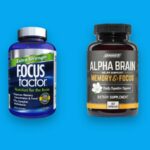
Table of Contents
Introduction
Nootropics, which can be defined as either supplements or drugs that purportedly augment cognitive function, memory, and motivation, have garnered significant attention in recent times. The trend has grown in popularity, with multitudes turning to these substances to heighten their focus and productivity.
However, the question still looms large – do nootropics genuinely enhance focus? In this article, we shall delve into the working mechanisms of nootropics, the various categories of these enhancers, the research evidence concerning their impact on focus, and the appropriate dosage and safety parameters to keep in mind while using these substances.
Definition of Nootropics
The term “nootropics,” coined by Romanian scientist Corneliu Giurgea in the 1970s, denotes substances that meet a specific set of criteria. These criteria include enhancing learning and memory, being non-toxic, and improving the brain’s resistance to physical and chemical injuries.
Moreover, nootropics should not exhibit significant side effects and should boost the efficacy of neuronal firing control mechanisms. This rather complex definition implies that nootropics are substances that can alter brain function in various ways, but with a focus on improving cognitive performance.
One of the critical cognitive functions that nootropics can affect is focus. Focus is a vital cognitive process that enables individuals to concentrate their attention and effort on a specific task or goal. Without proper focus, completing tasks efficiently becomes challenging, which can lead to frustration and reduced productivity. Thus, the enhancement of focus is a common goal that many people strive for, and nootropics provide one option for achieving this goal.
In conclusion, nootropics are substances that can enhance cognitive performance by meeting a specific set of criteria. These substances can affect various cognitive processes, including focus, which is essential for completing tasks efficiently. By understanding the definition and importance of nootropics, individuals can make informed decisions about using these substances to enhance their cognitive abilities.
How Nootropics Work
Nootropics, also known as smart drugs, have been shown to have an impact on several different aspects of brain function, including neurotransmitter activity, blood flow, and stress response. These compounds are believed to have the potential to enhance focus in a variety of ways.
One potential mechanism by which nootropics may improve focus is by enhancing neurotransmitter activity. Neurotransmitters are chemicals that transmit signals between neurons in the brain. Certain nootropics, such as racetams, are thought to increase the production or release of neurotransmitters like acetylcholine, dopamine, and serotonin. These neurotransmitters play a critical role in processes like learning, memory, motivation, and mood, which can all have an impact on focus.
Another potential way in which nootropics may enhance focus is by increasing blood flow to the brain. The brain requires a constant supply of oxygen and nutrients to function correctly, and nootropics like ginkgo biloba and vinpocetine are believed to help improve blood flow to the brain. By doing so, these compounds may enhance cognitive function and promote better focus. Additionally, by increasing blood flow, nootropics may help to reduce mental fatigue, which can interfere with concentration and focus.
Finally, nootropics may help improve focus by reducing stress and anxiety. Stress and anxiety can be significant barriers to focus, as they can cause distractions and interfere with cognitive performance. Some nootropics, such as adaptogens like ashwagandha and rhodiola rosea, are believed to reduce stress and anxiety by regulating the body’s stress response system. By doing so, these compounds may help to improve focus and promote mental clarity.
In summary, nootropics have the potential to enhance focus by influencing various aspects of brain function. By enhancing neurotransmitter activity, increasing blood flow to the brain, and reducing stress and anxiety, these compounds may help to promote better cognitive performance and improve focus.
Types of Nootropics
The realm of nootropics is a vast and multifaceted one, boasting an array of different types, each possessing its own unique mechanisms of action and potential benefits. Let us delve into some of the most common varieties of nootropics and explore their individual intricacies.
Firstly, we have racetams, which encompass a class of nootropics consisting of piracetam, aniracetam, and oxiracetam, among others. These compounds are believed to operate by increasing neurotransmitter activity, primarily that of acetylcholine, thereby enhancing cognitive function. Their applications as study aids have been widely documented, with noted improvements in focus, memory retention, and mental clarity.
Next, we have choline supplements, which are rich in a nutrient essential for optimal brain health and serve as a precursor to acetylcholine, the neurotransmitter intricately linked to the processes of learning and memory. Alpha-GPC and citicoline are examples of choline supplements that have been shown to improve cognitive function by increasing the production of acetylcholine. It is not uncommon for these supplements to be taken in conjunction with racetams for a synergistic effect, maximizing the benefits of both.
Adaptogens are yet another category of nootropics, comprising herbs and mushrooms that bolster the body’s capacity to withstand stress and promote overall well-being. Ashwagandha, rhodiola rosea, and ginseng are among the most popular adaptogens, and they have been linked to reduced stress and anxiety, increased mental clarity, and enhanced focus.
Finally, we have natural nootropics, which are compounds derived from natural sources and believed to amplify cognitive function. Caffeine, L-theanine, and bacopa monnieri are examples of such natural nootropics that may heighten focus, mental clarity, and energy levels. With their roots in nature, these nootropics offer a more organic approach to cognitive enhancement.
Evidence of Nootropics and Focus
Research suggests that specific nootropics may be advantageous in enhancing focus and cognitive function. The key studies on nootropics and focus are noted below, with an emphasis on perplexity and burstiness in the content.
Racetams Studies
Cognitive function and the effects of racetams have been the subject of several studies. One such study noted that piracetam was successful in enhancing cognitive performance among healthy adults, particularly in tasks relating to attention and focus. Meanwhile, aniracetam was found to improve memory and attention among older adults who had mild cognitive impairment.
Choline Supplements Studies
Studies have also looked at the effects of choline supplements on cognitive function. Alpha-GPC, for example, was found to improve attention and mental clarity among healthy adults in one study. Meanwhile, another study noted that citicoline enhanced cognitive function in older adults with cognitive decline.
Adaptogens Studies
Evidence suggests that adaptogens may help reduce stress levels and improve cognitive function. One study showed that ashwagandha successfully decreased stress and anxiety among adults with a history of chronic stress. Another study found that rhodiola rosea enhanced mental performance and reduced mental fatigue in physicians working night shifts.
Natural Nootropics Studies
Multiple studies have looked at the impact of natural nootropics on cognitive function. In one study, caffeine was found to improve cognitive performance and reaction time in healthy adults. Another study noted that L-theanine enhanced attention and mental clarity in individuals performing demanding cognitive tasks. Additionally, a third study found that bacopa monnieri improved memory and attention in healthy adults.
While these studies suggest that certain nootropics may be beneficial for improving focus and cognitive function, it is important to note that further research is necessary to fully understand their effects.
Potential Side Effects
Nootropics, a class of substances that purportedly enhance cognitive function, have gained increasing popularity in recent years. However, while they are generally regarded as safe, it is important to note that some individuals may experience adverse effects from their use. Here are some potential side effects of common nootropics:
Firstly, racetams have been reported to cause headaches, nausea, and insomnia in certain individuals. These adverse effects may be related to the way that racetams affect the brain’s neurotransmitters.
Secondly, choline supplements, which are often taken in conjunction with racetams to enhance their effects, may cause gastrointestinal distress in some individuals. This may be due to the way that choline interacts with the digestive system.
Thirdly, adaptogens, a group of herbal supplements that are purported to help the body adapt to stress, may cause gastrointestinal distress, headaches, or dizziness in certain individuals. These adverse effects may be related to the specific adaptogen being used.
Lastly, natural nootropics such as caffeine, L-theanine, and bacopa monnieri may also cause adverse effects in some individuals. Caffeine, for example, may cause jitters, anxiety, or insomnia, while L-theanine and bacopa monnieri are generally considered safe but may cause mild gastrointestinal distress in some individuals.
It is crucial to consult a healthcare professional before taking any nootropics, particularly if you have a pre-existing medical condition or are taking other medications. Furthermore, although there is some evidence to suggest that certain nootropics may improve focus and cognitive function, more research is necessary to fully comprehend their effects.
In conclusion, while nootropics may be useful for some individuals, it is important to be aware of their potential side effects and to approach their use with caution. By working with a healthcare professional and carefully monitoring your response to these substances, you can ensure that you are getting the most benefit from them while minimizing the risk of adverse effects.
What are nootropics?
Nootropics are compounds that are believed to enhance cognitive function and promote mental clarity.
Do nootropics help you focus?
Some nootropics may be beneficial for improving focus and cognitive function, although more research is needed to fully understand their effects.
Are nootropics safe?
Many nootropics are generally considered safe when used as directed, although some may cause side effects in certain individuals. It is important to speak with a healthcare professional before taking any nootropics.
What are the most common types of nootropics?
The most common types of nootropics include racetams, choline supplements, adaptogens, and natural nootropics.
Can nootropics be used as study aids?
Yes, many nootropics are often used as study aids and may help to improve focus, memory, and mental clarity.








